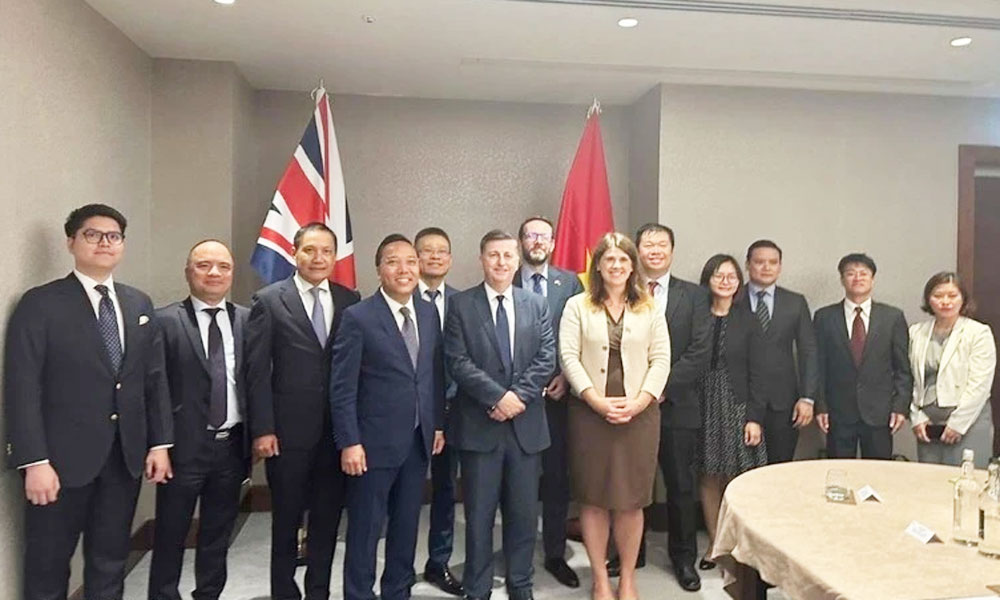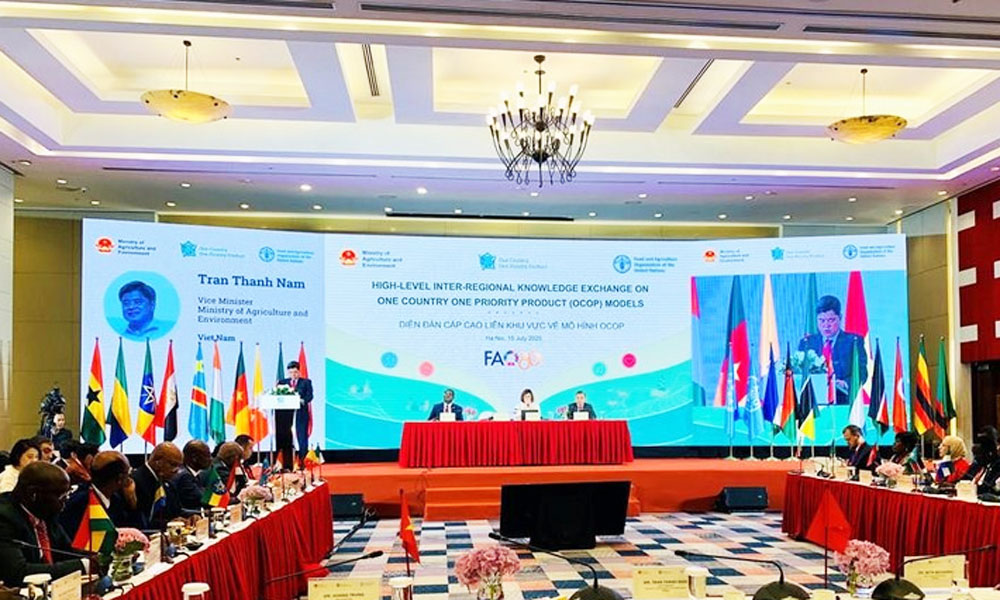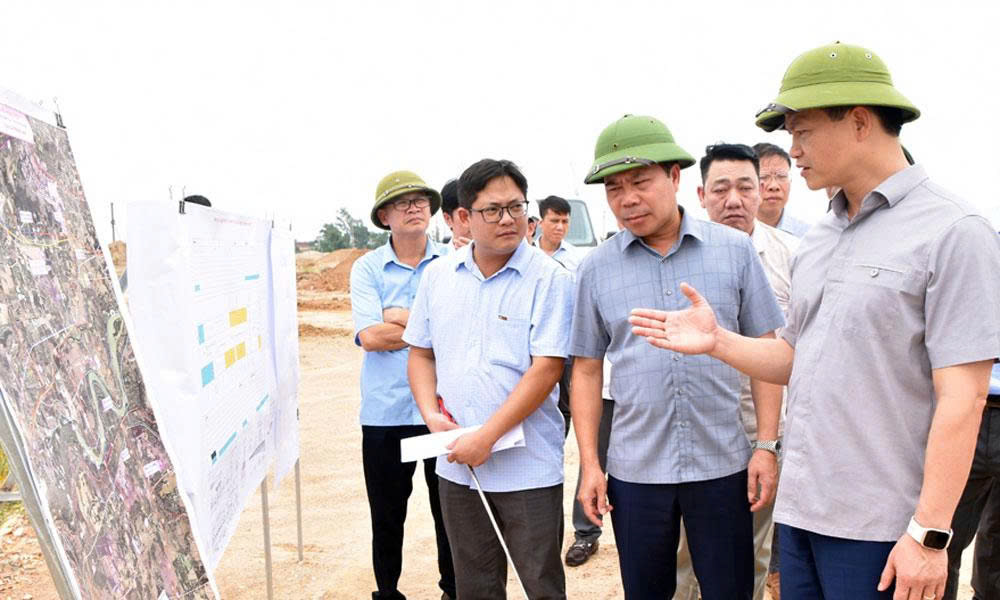Viet Nam, UK boost economic, trade ties
The meetings of the Viet Nam–UK Joint Economic and Trade Committee (JETCO) and the UK–Viet Nam Free Trade Agreement (UKVFTA) Trade Committee have delivered positive outcomes, helping to strengthen bilateral economic ties, resolve trade barriers, and create a more favourable business environment for enterprises from both countries.
Co-chaired by Vietnamese Deputy Minister of Industry and Trade Nguyen Hoang Long and UK Minister of State (Minister for Trade Policy and Economic Security) at the Department for Business and Trade Douglas Alexander, the 14th JETCO meeting in London on July 14 discussed and agreed on a wide range of practical areas for cooperation, including agriculture, healthcare, banking and finance, renewable energy, the promotion of bilateral trade and investment, education, and capacity building.
 |
|
Deputy Minister Nguyen Hoang Long, Minister of State Douglas Alexander, and representatives from ministries and the embassies of both countries pose for a group photo at the 14th JETCO meeting. |
Deputy Minister Long noted that over the past decade, trade and investment relations between Viet Nam and the UK have made remarkable strides.
On trade, the two countries have implemented the UKVFTA for more than four years, and most recently, the UK’s accession as the 12th member of the Comprehensive and Progressive Agreement for Trans-Pacific Partnership (CPTPP) has further strengthened bilateral cooperation.
In the energy sector, with strong support from the UK through the Just Energy Transition Partnership (JETP) and various bilateral cooperation initiatives, Viet Nam is gradually improving its regulatory framework, drawing on international expertise, experience and investment to advance its energy transition towards the goal of net-zero emissions by 2050.
The UK also reaffirmed its commitment to supporting Viet Nam’s energy transition through bilateral cooperation and the JETP framework.
Viet Nam provided updates on its policy reforms for renewable energy and offshore wind development, and called on the UK to step up support in management training, human resource development, and building a sustainable renewable energy supply chain.
In agriculture, food, and beverages, the UK expressed interest in Viet Nam’s guidance and support in opening its market to British poultry, beef, and seafood products.
It also welcomed Viet Nam’s proposal to facilitate the approval of Vietnamese poultry exports to the UK and other collaborative initiatives in this sector.
In finance and banking, the UK showed strong interest in supporting Viet Nam’s development of an international financial centre, and proposed cooperation in green bonds and establishing financial institutions in Viet Nam.
Viet Nam welcomed the proposals and encouraged the UK to submit detailed plans to the relevant Vietnamese authorities.
In education and capacity building, Viet Nam proposed enhanced collaboration on innovation, science and technology, English language teaching, and the improvement of higher education quality.
Regarding bilateral trade and investment, Viet Nam urged closer cooperation to maximise the benefits of the UKVFTA and CPTPP, enhance investment and trade promotion, organise regular business matching events, and create favourable conditions for enterprises to access each other's markets and cooperate in market regulation.
At the UKVFTA Trade Committee meeting held the same day, the two sides reviewed the implementation of the agreement based on reports from specialised sub-committees covering trade in goods, customs, sanitary and phytosanitary measures, services and investment, and trade and sustainable development.
Both parties acknowledged the progress achieved and the tangible benefits the agreement has brought to businesses and citizens. They also discussed ways to address remaining market access issues for goods and services to further promote bilateral trade and investment.
Speaking at the close of the session, Deputy Minister Long affirmed that the matters discussed at JETCO 14 and the UKVFTA Trade Committee would be further pursued at the technical level.
The two sides agreed to work closely together to resolve these issues effectively and elevate the bilateral partnership to new heights.
The same day, Long met with UK Prime Minister’s Trade Envoy to Viet Nam Matt Western to discuss trade, investment, and energy cooperation, highlighting the UK’s role as a key partner and its support under the JETP framework.
He also had working sessions with representatives of the UK–ASEAN Business Council and major firms including HSBC, Prudential, Arup, and BP.
Discussions focused on investment opportunities, particularly in renewable energy, with UK businesses expressing strong interest in partnering with Viet Nam in the time ahead.
Earlier, on July 11, Deputy Minister Long attended the Viet Nam–UK Business Forum 2025 in Edinburgh. He highlighted the dual momentum from the UKVFTA and the UK’s CPTPP accession, which helped lift bilateral trade to 8.4 billion USD in 2024, up 18% year-on-year, making the UK Viet Nam’s third-largest export market in Europe.
He called on UK firms to leverage tariff preferences and rules of origin to boost cooperation in services, finance, and high-value agri-food products, while encouraging deeper engagement in Viet Nam’s energy transition. Discussions also explored trade prospects, green finance, and the country’s renewable energy roadmap.
At the forum, the UK’s BP Group and Viet Nam’s T&T Group signed an MoU to promote e-mobility through a battery-swapping ecosystem for electric motorbikes.
According to the Department of Viet Nam Customs, bilateral trade totalled more than 4.3 billion USD in the first half of 2025, up 9.6% year-on-year. Viet Nam’s exports reached nearly 3.4 billion USD (up 8.2%), while imports from the UK totalled 461.6 million USD (up 23.1%).
In 2024, bilateral trade exceeded 8.4 billion USD, up 18% from 2023. Viet Nam’s exports accounted for over 7.5 billion USD (up 18.9%), and imports stood at 881.1 million USD (up 10.8%).
The UK is currently Viet Nam’s third-largest export market in Europe, following the Netherlands (13.8 billion USD) and Germany (11.7 billion USD).
 Bắc Ninh
Bắc Ninh









Reader's comments (0)